IT-FR cooperation in Heritage Science
Human-centered approach for cultural heritage in green transition
Disciplines talking to each other
April 27th 2023 | Online Event
H 10:30 - 12:30 CEST
The IT-FR collaboration in Heritage Science announces the next event of the collaboration that promises to be both enlightening and informative for those interested in the intersection of culture, heritage, and sustainability.
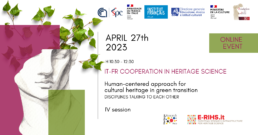
The virtual event will take place on April 27th from 10:30am to 12:30pm (CEST).
The discussion will bring together Italian and French experts from various fields to discuss the current context of cultural heritage in the green transition with the objective of providing insights from different disciplines and perspectives.
The organisation of the event has been coordinated by the Istituto di Scienze del Patrimonio Culturale del Consiglio Nazionale delle Ricerche, the French ministry of Culture, the Fondation des Sciences du Patrimoines, the Institut Français Italia, the French Embassy in Italy, and the Direzione Generale Educazione, ricerca e istituti culturali.
Registration is still open!
The program and the link to the online event will be released shortly to all participants who will kindly fill in the registration form.
To facilitate the organization of the event, please bear in mind that registration will be open until April 21st, when participants will be reached out with the link to access the event.
We believe this event will be of interest to a wide range of actors and professionals in the fields of culture, heritage, and sustainability. We hope you can join us for this unique opportunity to engage in a lively discussion with Italian and French academics, professionals and institutional representatives.
We look forward to seeing you online on April 27th!
All the info in your language!

Presentations by speakers at the event are available here
Historical gardens challenges in the context of Climate Change
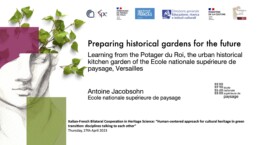
Preparing historical gardens for the future
Learning from the Potager du Roi, the urban historical kitchen garden of the Ecole nationale supérieure de paysage, Versailles
Potager du Roi is a remarkable garden that fits into a unique urban composition. Since its creation starting in 1678, the site has undergone many changes without ever losing its original structure. Many architectural and plant structures of large gardens, such as walls, fountains and many linear tree plantings or parterres, have a life cycle that is approximately centennial. Potager du Roi was completed in 1683. The first major restoration occurred in the 1780’s and the second began in the 1880’s. Today, Potager du Roi suffers from a fourty-year deficit of sustained investment.
This presentation will describe how an agroecological approach, based both on historical and on contemporary practices, is being applied to conserve and share the unique and exceptional atmosphere of the garden designed by La Quintinie; to position the site as a living heritage at the heart of contemporary debates and in particular sustainable practices concerning food and health issues in an urban environment.
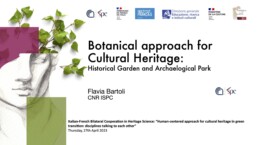
Botanical approach for Cultural Heritage: Historical Garden and Archaelogical Park
The Plant Blindness is defined as “the inability to see plants in the surrounding environment”, with the consequence of failing to recognize their importance. Concept dating back to 1998, it is the result of years of research by James Wandersee and Elizabeth Schussler.
Historic gardens, like archaeological parks, are often hot spots of biodiversity and refugia. Places within which many rare or legally protected plant species are saved from the incessant advance of urbanization. The management conditions linked to the conservation of monuments allow these species to survive. Within these places, therefore, the right balance must be found for the conservation and enhancement not only of the monuments present but also of the biodiversity present which therefore adds value to the site itself. Only correct conservation and targeted enhancement can defeat the plant blindness not only of visitors but also of those who manage and maintain the site. In my speech today we will see a series of problems related to the conservation and enhancement of the plant component within historic gardens but also in archaeological parks, scrolling through some emblematic case studies.
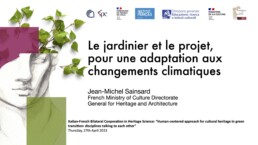
Le jardinier et le projet, pour une adaptation aux changements climatiques
To see climate change as a death knell is a simplistic view of the garden as a work. Even if it is worrying, the disappearance of certain plants cannot be considered impossible for the survival of gardens. In contrast to the forest, it must be remembered that the issues at stake in a garden are primarily landscape issues. Of course, replanting has a high cost, but we must pay attention to the experimental dimension of the garden and the trials to be multiplied.
Landscape designers are thus led to rethink gardens to create other forms which enrich the garden with different meanings. The history of gardens and the structures still in place confirm that this research is familiar. The experience of plants becoming unsuitable, obliging us to redesign entire structures, reminds us that the answer is always in the project, that the historic garden is also composed of the surrounding landscape, of axes, of full and empty spaces, of buildings, of uses and practices, of the economy. This requires excellent capacities of intellectual openness and pedagogy to question certain historical forms and compositions. We, therefore, choose to be optimistic, to think of ourselves as being at the dawn of a new way of thinking about the historic garden, which trusts in the capacity of living organisms to adapt to the project and in garden management.
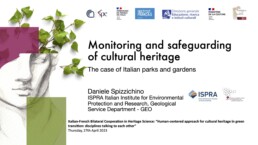
Monitoring and safeguarding of cultural heritage: the case of Italian parks and gardens
Italy and France, but in general the Euro‐Mediterranean area will facing important challenges in the next years relating to the conservation and protection of the natural and cultural heritage threatened by the direct and indirect effects due to Climate Change.
ISPRA, MIC and ISCR have been collaborating for almost twenty years for the definition of indicators of natural and anthropic risk on the national cultural heritage through the Carta del Rischio project. Indeed, thanks to this platform, today, for example, it is possible to analyze the distribution, typology and natural and anthropic pressures on specific categories, such as Parks and Gardens.
From the analysis of static hazard in the coming years it will be possible to move on to dynamic monitoring, almost in real time, thanks also to the support of services and products derived from earth observation.
With this in mind, the Ministry of Culture is developing a pilot project for the national monitoring of CH. The general structure of the Plan and the methodological procedures under implementation will certainly be an example for future collaborations between Italy and France.
Further information
The event is fourth of a series of seminars.
- The First event held in Rome on September the 15th, 2022
- The second held online on November the 10th, 2023
- The third held in Paris on January 27th, 2023
For further information about previous events, we invite you to visit the pages dedicated to the Italian-French partnership for heritage science.
